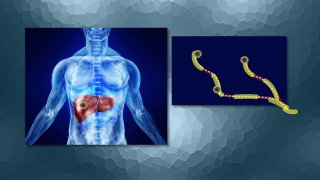
A UCLA-led study published Wednesday identifies a first-line liver cancer treatment that significantly improves the survival chance for patients.
The study, published in the New England Journal of Medicine, focuses on hepatocellular carcinoma, the most common type of liver cancer, and it found that a patient's risk of death is reduced by 42% through a drug combination of "atezolizumab, an immunotherapy drug that boosts the body's natural defenses, and bevacizumab, an anti-angiogenesis drug that inhibits the growth of tumors' blood vessels."
Both drugs are monoclonal antibodies -- which attach themselves to specific proteins and disable them.
Atezolizumab targets a protein produced by cancer cells that shuts down the immune system's infection-fighting T-cells, preventing them from attacking the cancer, according to the study's principal investigator and lead author, Dr. Richard S. Finn, a professor of medicine at the David Geffen School of Medicine at UCLA and director of the signal transduction and therapeutics program at the UCLA Jonsson Comprehensive Cancer Center.
Bevacizumab interferes with a tumor's blood supply, preventing the cancer from growing and spreading through the body, Finn said.
The drug combination led to a 41% decrease in the patient's risk of the disease worsening, and the percentage of patients whose liver cancer shrank or went away completely more than doubled, according to the study.
"The therapy is a real game-changer for people diagnosed with this aggressive disease," Finn said.
Local
Get Los Angeles's latest local news on crime, entertainment, weather, schools, COVID, cost of living and more. Here's your go-to source for today's LA news.
"We now have a new therapy that not only improves survival for people with the disease, which is very challenging to treat, but that helps them live longer while maintaining a high quality of life."
The current prognosis for patients with advanced liver cancer is poor, and they have limited treatment options, Finn said.
The drug combination is the most recent first-line therapy discovered to improve survival for hepatocellular carcinoma patients since the drug sorafenib, which was approved in 2007.
The drug combination was tested on 501 patients, all 18 and older, who were being treated at multiple centers worldwide. A year after the patients started the treatment, the survival rate for the patients given the combination drug was 67.2%, compared to 54.6% for the control group, which was put on sorafenib.
Liver cancer deaths have more than doubled since 1980, and 800,000 people are diagnosed with it every year, according to the American Cancer Society.
"That's why it's so important that we now have something in the front- line setting -- after more than a decade -- that markedly improves survival in this very challenging disease," Finn said.



